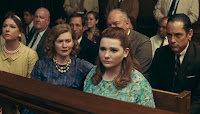There is a reason you have not seen dozens of earnest documentaries and melodramatic TV movies about the case that gave rise to the Miranda Warning. The real-life events did not fit the preferred media “narrative.” The titular Ernesto Miranda was not found innocent of kidnapping and raping the woman referred to as “Trish Weir” in this film. The Supreme Court only annulled his trial, allowing Arizona to re-try him without the excluded confession. Of course, reliving the trial experience was a painful ordeal for his victim. Director Michelle Danner finally presents the Miranda case from her perspective in Michelle Danner’s Miranda’s Victim, which releases today in theaters and on-demand.
As viewers will see only too clearly, in 1963, the horror of a rape continued for victims when they tried reporting it to a doctor and the police. That is why Weir’s mother Zeola keeps telling her to forget it and move on with her life. Although never explicitly established, it is implied Mother Zeola endured something similar earlier in life, but her maternal instincts are still clearly flawed. Regardless, Weir gets crucial support from her sister and brother.
The latter even gets a partial plate number for a car matching Weir’s description, returning to the scene of the crime. With that, Det. Carroll Cooley tracked down Miranda. For the era, Cooley was reasonably respectful of Weir. He was also relatively restrained in his interrogation of Miranda, but he obviously did not Mirandize him.
Unfortunately, Miranda was the perfect test case for the ACLU and hotshot attorney John J. Flynn. In a scene guaranteed to cause consternation, Maricopa County prosecutor Lawrence Turoff reaches out to Flynn, hoping he will reconsider the Miranda case, asking “What about Miranda’s victim.” In the film, Flynn replies: “Lawrence, I really don’t care.”
Of course, Weir will have to endure another grilling from Flynn when Turoff re-tries Miranda. Danner and screenwriters George Kolber, Richard Lasser, and J. Craig Stiles are more interested in giving a voice to sexual assault victims than re-litigating the Miranda Warning ruling. Yet, it is hard to think of a sexual assault victim more silenced and marginalized than her, considering the ruling that bears her assailant’s name is regularly celebrated as a progressive victory.
This story will be new to a lot of viewers, but despite some unnecessary flashbacks, Kolber and company do a nice job explaining the circumstances of the investigation and subsequent court cases. Throughout it all, they squarely focus on Weir and the ways she was repeatedly victimized by this case. Danner’s approach as a filmmaker is always sensitive and respectful, but also conventional and decidedly not flashy, which was probably for the best.
Abigail Breslin is incredible as Weir. It is an emotionally devastating performance that is never cliched. She ought to have a place in the awards chatter, but she won’t. Mireille Enos ultimately makes her mother a very sad figure. Luke Wilson and Enrique Murciano are solid as Weir’s allies, Turoff and Cooley, but they are nowhere near Breslin’s level.
However, Andy Garcia is terrific and rather touching as Alvin Moore, Miranda first attorney, who genuinely believed in his innocence. In contrast, the way Ryan Phillippe portrays Flynn as an arrogant, compassionless shark is sure to be controversial. Sebastian Quinn performance as Miranda is much subtler, but ultimately quite unsettling. Of course, Donald Sutherland is convincingly old and distinguished playing Judge Wren, presiding over the second trial.
A film telling the full Miranda story was long overdue. Hopefully, whenever viewers hear Miranda references going forward, they will also think of the woman Weir represents. Arguably, it is fitting that the Miranda Warning takes its name from a violent felon. Danner and company show us how he was still brought to justice, even after the Warren Court’s rulings greatly strengthened the rights of the accused. Her film lands hard as a human drama and as an appeal for greater empathy for victims of violent sexual crimes. Highly recommended, Miranda’s Victim releases today (10/6) at the Laemmle Town Center.

